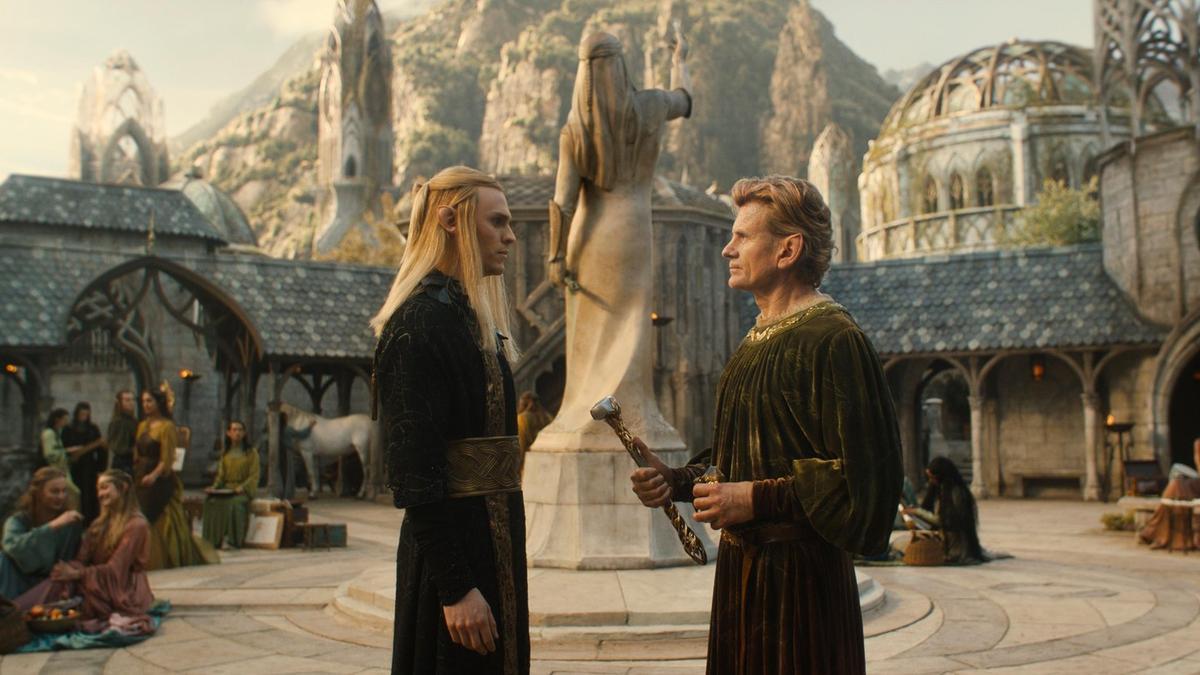
The season finale of the second installment of “The Rings of Power” may not have addressed every lingering question or satisfied the most stringent Tolkien traditionalists, yet it managed something far more substantial and ambitious: it transformed the show from feeling like a lavish gamble into a vigorous and immersive chronicle of Middle-earth. What began as a dazzling, albeit uneven, effort to resurrect the enchantment of Tolkien’s universe has evolved into something broader and bolder, showcasing a surprising level of confidence. After navigating a debut season that seemed hesitant amid its own predictions of grandeur, the showrunners have seemingly embraced the profound scope and limitless lore inherent in the source material, culminating in an epic crescendo.
This sophomore season absorbed and learned from the tempered critiques directed at its freshman outing, and the finale stands as evidence of this significant course correction. Season one, with its quintessential marks of grand TV spectacles — the vast landscapes, the immaculate CGI polish, and of course, the massive weight of Tolkien’s legacy like an ever-present shadow — felt like a beautifully gilded cage, constrained by the weight of its expectations. Yet, with a gentle push from a curiously affable Dark Lord, the series appears to have liberated itself from those initial constraints.
Characters and storylines that appeared peripheral now weave together, enhancing the central themes around power, corruption, and the allure of evil. This transformation results in a more cohesive narrative, albeit with some distance still to travel towards perfection. The ominous shadow of Sauron looms larger in this season, with Charlie Vickers portraying the slow-burn villainy of “the great deceiver” at its peak — a beguiling master manipulator veiled in an unsettlingly convincing facade. Opposite him, Charles Edwards’ Celebrimbor shines equally; a visionary whose fervor and ambition mask his obliviousness to the elaborate trap slowly encircling him. Their exchanges evolve into a tragic pas de deux of trust and betrayal, with Edwards’ nuanced unraveling perfectly contrasting Vickers’ sinister aplomb. The revelation of Sauron’s true essence isn’t a sudden shock but rather a gradual realization, carving its path over the entire season. Together, Vickers and Edwards elevate “The Rings of Power” into an intricate psychological tragedy, emblazoned with epic stakes.
The finale wields a vast, battle-heavy conclusion that delivers upon the anticipated spectacle, surpassing nearly all competition in the fantasy realm. Whether it’s the ethereal glow of a war-ravaged Eregion or the thunderous battle with Durin’s Bane deep inside Khazad-dûm, the visual execution in this finale is astounding. Yet, beneath the blazing swords and crumbling fortresses, the narrative retains a vital emotional core. This is beautifully exemplified by Prince Durin IV (Owain Arthur) and his painfully succinct relationship with his father, King Durin III. Their strained kinship, shaped by steadfast duty and stubborn pride, adds a poignant human element, even amidst the looming threats of a Balrog and the allure of mithril mines.
.
While many novice tales choose to anchor their fantastical elements within a gritty realism, “The Rings of Power” revels in the lustrous beauty of Middle-earth. It beckons the audience to lose themselves in the awe and magic that fantasy once wielded, from the radiant splendor of Valinor to the treacherous light reflecting off molten mithril, evoking the feeling of history unfolding before our eyes. Even when the plot momentarily falters, the grandeur remains steadfast.
This is precisely where the show reaches its zenith. While “The Rings of Power” might not cater to all tastes, especially those craving the dark grittiness reminiscent of Westeros, it offers something else entirely: a return to fantasy’s roots and the enchanting wonder it once commanded. In essence, it reminds us of the joy in believing the extraordinary, in surrendering to a world where good and evil remain locked in a timeless battle — with all the beauty, danger, and wonder such a narrative offers.
From the golden canopies of Lindon to the dusty sands of Rhûn, “The Rings of Power” never ceases to captivate. For all its successes, though, the show still wrestles with its weaker elements. The Harfoots, conspicuously sidelined in the finale, continue to feel disjointed from the main plotline, their arc seemingly appended to inject moments of whimsy into the darkening narrative. It wouldn’t be surprising to see their presence diminished in future seasons.
A poignant conclusion to Sam Hazeldine’s portrayal of Adar left behind a bittersweet afterthought, recognizing that his excellent performance will no longer grace the screen. However, audiences were granted a somewhat overplayed “Grand-Elf” reveal — a revelation arguably too obvious to have been kept under wraps for so long.
As the curtain falls on season two, it is evident that “The Rings of Power” has heeded its earlier missteps. It strides forward with greater confidence in its narrative, assurance in its character arcs, and an unapologetic embrace of Middle-earth’s expansive mythos. Although it may never entirely eclipse the enduring shadow of Peter Jackson’s cinematic masterpieces, the series continues to carve its unique path. Middle-earth emerges once more as a realm of wonder, peril, and irresistible allure. For that, viewers and fans can only feel gratitude.
All episodes of “The Rings of Power” are streaming on Amazon Prime Video.












